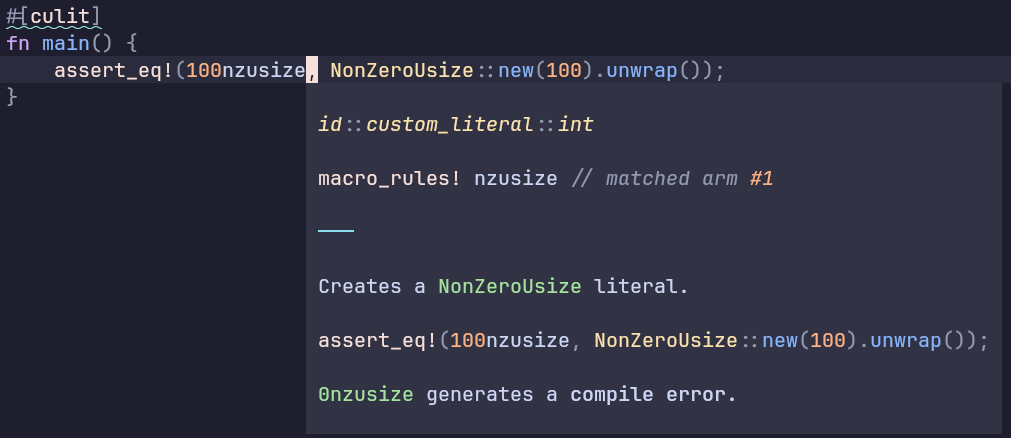You probably know that numbers in Rust can be suffixed to specify their type, e.g. 100i32.
But did you know that syntactically any literal can have a suffix? And did you know that the suffix can be whatever you want?
This crate provides an attribute macro #[culit] for "Custom Literals". When applied to any statement, it enables using custom literals in that statement.
[dependencies]
culit = "0.1"Note: culit does not have any dependencies such as syn or quote, and it is a simple mapping SourceCode -> SourceCode, so compile-speeds will be very fast.
A NonZeroUsize literal that fails to compile if it is 0: 100nzusize
use culit::culit;
use std::num::NonZeroUsize;
#[culit]
fn main() {
assert_eq!(100nzusize, NonZeroUsize::new(100).unwrap());
// COMPILE ERROR!
// let illegal = 0nzusize;
}
mod custom_literal {
pub mod int {
macro_rules! nzusize {
// handle `0` specially
("0" $base:literal) => {
compile_error!("`0` is not a valid `NonZeroUsize`")
};
($value:literal $base:literal) => {
NonZeroUsize::new(usize::from_str_radix($value, $base).unwrap()).unwrap()
};
}
pub(crate) use nzusize;
}
}Hovering over the custom literals shows documentation for the macro that generates them. You can also do "goto definition". It's quite nice!
Python-like f-strings: "hello {name}"f
use culit::culit;
use std::time::Duration;
#[culit]
fn main() {
let name = "bob";
let age = 23;
assert_eq!(
"hi, my name is {name} and I am {age} years old"f,
format!("hi, my name is {name} and I am {age} years old")
);
}
mod custom_literal {
pub mod str {
macro_rules! f {
($value:literal) => {
format!($value)
};
}
pub(crate) use f;
}
}Duration literals: 100m, 2h...
use culit::culit;
use std::time::Duration;
#[culit]
fn main() {
assert_eq!(
100d + 11h + 8m + 7s,
Duration::from_secs(100 * 60 * 60 * 24)
+ Duration::from_secs(11 * 60 * 60)
+ Duration::from_secs(8 * 60)
+ Duration::from_secs(7)
);
}
mod custom_literal {
pub mod int {
// day
macro_rules! d {
($value:literal $base:literal) => {
Duration::from_secs(60 * 60 * 24 * u64::from_str_radix($value, $base).unwrap())
};
}
pub(crate) use d;
// hour
macro_rules! h {
($value:literal $base:literal) => {
Duration::from_secs(60 * 60 * u64::from_str_radix($value, $base).unwrap())
};
}
pub(crate) use h;
// minute
macro_rules! m {
($value:literal $base:literal) => {
Duration::from_secs(60 * u64::from_str_radix($value, $base).unwrap())
};
}
pub(crate) use m;
// second
macro_rules! s {
($value:literal $base:literal) => {
Duration::from_secs(u64::from_str_radix($value, $base).unwrap())
};
}
pub(crate) use s;
}
}The possibilities are endless!
#[culit] recursively replaces every literal that has a non-standard suffix with a call to the macro
at crate::custom_literal::<type>::<suffix>!(...), for example:
100kmexpands tocrate::custom_literal::int::km!("100" 10)"100"is the value10is the base (decimal)
70.8e7feetexpands tocrate::custom_literal::float::feet!("70" "8" "e7")"70"is the part before the decimal"8"is the part after the decimal"e7"is the exponent
'a'asciiexpands tocrate::custom_literal::char::ascii!('a')b'a'asciiexpands tocrate::custom_literal::byte_char::ascii!(97)"foo"barexpands tocrate::custom_literal::str::bar!("foo")b"foo"barexpands tocrate::custom_literal::byte_str::bar!(b"foo")c"foo"barexpands tocrate::custom_literal::c_str::bar!(c"foo")
Whatever the macros in custom_literal::float or custom_literal::int expand to needs to implement the Neg trait in order to allow using - with the custom numeric literals.
You might think that a number like -100 is a single literal, but it is not. It is 2 tokens: a punctuation , followed by a literal 100. -100km expands like this:
-is a punctuation, it is kept as-is100kmis a literal100with suffixkm. It expands tocrate::custom_literal::int::km!("100" 10)."100"is string representation of the number,10is the base (which could also be2,8or16)- The macro receives a string
"100"instead of an integer100because procedural macros cannot create integer literals that are larger thanu128, but we want to support integer literals of arbitrary size. - More importantly, interpreting the number itself without the base is a logic error, so passing a string instead of integer makes it far less likely that you'll make mistakes
-100kmoverall expands to-crate::custom_literal::int::km!("100" 10). Notice the-at the beginning, it is kept the same. Whateverkm!expands to needs to implement theNegtrait to be able to be used with the-operator.
Here's a skeleton for the custom_literal module which must exist at crate::custom_literal.
This module adds a new literal for every type of literal:
mod custom_literal {
pub mod int {
// 0x100custom
//
// ^^ base - `16`. Can be one of: 16, 10, 8 or 2
// ^^^ value - "100"
macro_rules! custom {
($value:literal $base:literal) => {
// ...
}
}
pub(crate) use custom;
}
pub mod float {
// 70.3141e100custom
//
// ^^ before_decimal - "70"
// ^^^^ after_decimal - "3141". Can be "" if no after_decimal
// ^^^ exponent - "100". Can be "" if no exponent
macro_rules! custom {
($before_decimal:literal $after_decimal:literal $exponent:literal) => {
// ...
}
}
pub(crate) use custom;
}
pub mod str {
// "foo_bar"custom
// ^^^^^^^^^ value - "foo_bar"
macro_rules! custom {
($value:literal) => {
// ...
}
}
pub(crate) use custom;
}
pub mod char {
// 'x'custom
// ^^^ value - 'x'
macro_rules! custom {
($value:literal) => {
// ...
}
}
pub(crate) use custom;
}
pub mod byte_char {
// b'a'custom
// ^ value - 97
macro_rules! custom {
($value:literal) => {
// ...
}
}
pub(crate) use custom;
}
pub mod byte_str {
// b"foo_bar"custom
// ^^^^^^^^^^ value - b"foo_bar"
macro_rules! custom {
($value:literal) => {
// ...
}
}
pub(crate) use custom;
}
pub mod c_str {
// c"string"custom
// ^^^^^^^^^ value - c"string"
macro_rules! custom {
($value:literal) => {
// ...
}
}
pub(crate) use custom;
}
}You need to use #[culit] attribute everywhere you want to use these literals. On nightly, you can apply it on the module:
#![feature(custom_inner_attributes)]
#![feature(proc_macro_hygiene)]
#![culit::culit]While this works, I wouldn't recommend it - currently rust-analyzer is unable to properly work with custom inner attributes
that modify the whole crate. For example, if you write 0nzusize which produces a compiler error, the span of the error will point to
the macro crate::custom_literal::int::nzusize but not the actual 0nzusize, which makes it very hard to debug these





